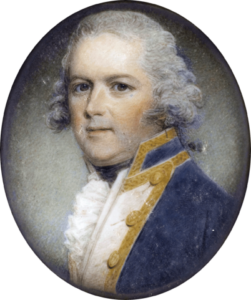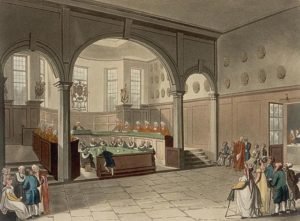Captain Inglefield Sues his Wife for Adultery with a Black Servant – July 1786
During the third week of July 1785 the whiff of a scandal had arisen in the newspapers when an un-named captain of the navy had been reported as seeking a divorce from his wife on account of her having fancied the countenance of a Negro . When the General Advertiser had followed up the story a week later on 26 July it had provided its readers with a clue as to the identity of the captain by stating that he was known as a man whose miraculous escape and sufferings had earned him royal favour and a new command.
Even the less astute of the General Advertiser s readers had been able to deduce that the captain was none other than the 37 year-old John Nicholson Inglefield of the Medway-based guardship Scipio 64. This was the officer who had fled the sinking Centaur 74 and left his four hundred crew and passengers to drown during the Central Atlantic Hurricane of September 1782. The miraculous escape referred to in the General Advertiser had been the subsequent sixteen-day voyage he had made in the Centaur s pinnace to reach the Azores, the tale of which had been recounted in a pamphlet Inglefield had later produced in an effort to justify his conduct.
At some point Inglefield had brought a black servant, John Webb, back from overseas and this man had apparently become a favourite of his wife, Ann, to the detriment of the family s other staff. Either through malice or genuine uneasiness Mrs Inglefield s apparent partiality to Webb had been reported to the captain whose initial response, although he was totally inclined to reject any hint of impropriety, had been to caution his wife to be careful. But upon kissing his eldest daughter some time later Inglefield had been astonished to hear her declare My Mama doesn t kiss you she likes the black man and kisses him! Salaciously, the General Advertiser had reported, almost certainly falsely, that the day after her daughter s revelation Mrs Inglefield had excused herself from attending a ball at Chatham, and that the captain had returned home to find her naked in bed with Webb, and had apparently turned both out of the house in their unclothed state.
The implausibility of the latter story notwithstanding, at about the same time in 1784 Inglefield had been advised by another servant on board the Scipio that Mrs Inglefield had been seen to lock herself in the after cabin with Webb, whilst he had also received an anonymous letter warning him of his wife s inappropriate behaviour towards the footman. During December 1784 an increasingly concerned Inglefield had interviewed Webb in the presence of a clergyman and the Scipio second lieutenant, William Brett, and he had been astounded to be told that his wife had been attempting, unsuccessfully, to seduce the servant for the best part of a year. Immediately Inglefield had written to both his wife and her mother, with whom she was then staying, advising that he would never live with her again.
As soon as her husband s indignant and passionate missive had been received on Christmas Day 1784 a hysterical and overwrought Mrs Inglefield had fought to refute the charges laid against her. By all accounts Webb had been virtually kidnapped by Mrs Inglefield s friends, and upon being hauled before a magistrate at Greenwich he had retracted the evidence that he had earlier laid before the captain, stating that he had been frightened into making a false confession by Inglefield s outraged approach and demeanour.
By now a hare had been set running, and following much correspondence between the captain, his wife, and friends advocating on her behalf, Mrs Inglefield had felt constrained to lay the case before an ecclesiastical court where she would seek the restitution of her connubial rites . Her husband had responded by seeking a divorce in the same court on the basis of his wife s criminal conversation with Webb. But if both parties had been seeking a speedy conclusion to the affair than they were to be disappointed by the slow workings of the spiritual court, and although a date of November 1785 had been suggested for the case to be heard, it transpired that another eight months would elapse before the couple finally faced judgement.
In the meantime, during the last week of July 1785, the General Advertiser had delved further into the affair, and it had printed affidavits made by some of the individuals involved. The first had been that of Webb s, which had been made on 16 July, to the effect that the accusations against Mrs Inglefield were false, and that nothing disreputable had ever occurred between them. Yet in response to Webb s assertions that he had felt threatened by Inglefield during his interrogation the previous December, Lieutenant Brett stated in his affidavit dated 25 July that he had not witnessed any intimidation of Webb by the captain, and that the footman had not displayed any sign of fear. Brett further asserted that some time afterwards he had personally interviewed Webb who had repeated his accusations against the captain s wife, and had also admitted that although he had enjoyed congress with a maid in the Inglefield s service, he had not welcomed Mrs Inglefield s advances as she was his superior, and that if he had accepted them the captain would have found out and killed him. In his affidavit signed the same day, Lieutenant Henry Rogers of the Scipio s Marines confirmed Brett s evidence, adding that Webb had also told him that he had avoided Mrs Inglefield whenever possible as he was discomforted by her partiality towards him.
Matters had then taken an even uglier course when Inglefield had written to the General Advertiser from the Scipio s berth at Chatham on 30 July, re-asserting his accusation in the light of their publication of the affidavits. Soon letters between all the main protagonists had been placed in the public domain, whereupon the General Advertiser had decided that it was time to draw a veil over the sad affair pending the court case.
In early June 1786, with Inglefield s three year commission having expired, the Scipio arrived at Chatham from Sheerness to be paid off before being recommissioned under a new captain. A matter of weeks later, on Saturday 22 July, the case of adultery against Mrs Inglefield was heard before Sir Peter Calvert in the Doctor s Commons. When it finally came to pass judgement Sir Peter found the lady to be totally innocent, and adding insult to injury he recommended that the captain should take his wife home and treat her with matrimonial affection.
Unsurprisingly Mrs Inglefield was not taken home by the captain, and she was never again treated with matrimonial affection, for thereafter the couple, although married in name, remained separated. Equally unsurprisingly the dispute rumbled on, and if anything it was somewhat inflamed when early in the following year the new Rover magazine pushed the barriers of bad taste be publishing an illustration showing Mrs Inglefield tempted by an African devil, to search after forbidden fruit .
During 1787 Mrs Inglefield published a pamphlet titled Mrs Inglefield s Justification, containing the Proceedings in the Ecclesiastical Court before the Right worshipful Peter Calvert LLD, by Mrs Ann Inglefield . Her intention was to seek vindication of her character from the public in accordance with the verdict of the court. It didn t take long for her husband to respond with his own pamphlet entitled Captain Inglefield s Justification of his Conduct, or a reply to a pamphlet entitled Mrs Inglefield s Justification . This was a rebuttal of the court s findings and an insistence of his wife s guilt.
Denied a divorce, and tainted in the view of some by his conduct in command of the Centaur, Inglefield spent the greater part of the next twenty years abroad, having accepted towards the end of his career the civil positions of commissioner at a number of foreign bases. Although he declined flag rank in 1799 his and Ann s son, Samuel Hood Inglefield, their grandson Edward Augustus Inglefield, and their great-grandson, Edward Fitzmaurice Inglefield, all became admirals in the navy, whilst one of their daughters married the future Admiral Sir Benjamin Hallowell, and another married Captain Henry Whitby.


